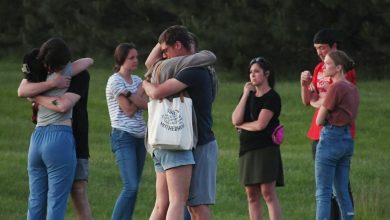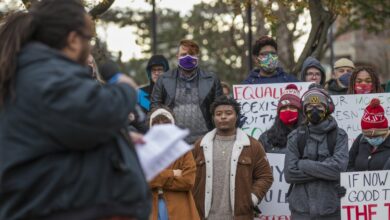After Mysterious Suspension of Award-Winning UCLA Prof, Scientists Fight Back

More than 300 academic scientists from around the world are fighting a decision by the University of California at Los Angeles to suspend an award-winning faculty member without pay, ban her from campus, prohibit her from speaking to her students, and cut her off from a National Science Foundation grant she brought in.
The university isn’t saying why penalties were imposed on Priyanga Amarasekare, a tenured professor of ecology and evolutionary biology who’d recently been awarded two of the highest honors in her field.
Amarasekare has been prohibited by the university from talking about the campus proceedings that resulted in the sanctions. Contacted this week by The Chronicle, she declined comment.
But conversations with current and former students and faculty members both within and outside UCLA reveal a messy dispute over allegations of racial discrimination in the ecology department and retaliation against those who complain. According to information obtained by The Chronicle, some of Amarasekare’s critics had suggested that she was using a time of national racial unrest to further her own grievances and turn students against the department.
In an email list set up in 2020 for the department of ecology and evolutionary biology, she complained of being repeatedly passed over for promotions and leadership opportunities after drawing attention to discrimination that she says she and others had experienced in her department.
“All decision-making authority has been granted to a few white male professors,” Amarasekare, a native of Sri Lanka and one of two women of color with tenure in the department, wrote. The department is trying to combat racism, she concluded, “by rendering invisible the very individuals it purportedly wishes to protect.”
After learning of her suspension, some of the prominent ecologists who have recommended her for promotions at UCLA circulated a petition that was sent on Monday to Michael V. Drake, president of the University of California, Gene D. Block, chancellor of UCLA, and the University of California regents. The petition, signed by a worldwide assortment of ecologists and other scientists, most from the United States and Europe, said they were “deeply troubled” by what they considered the secretive nature of the actions taken against “a highly distinguished ecologist.”
A UCLA spokesman said, in an email on Tuesday, that the university could not comment on the specifics of Amarasekare’s case because of personnel processes and privacy laws. However, in a statement attributed to the university, he said that UCLA supports freedom of expression and doesn’t condone retaliation, and that it’s “committed to maintaining a diverse, inclusive, and respectful learning, teaching, and working environment for all members of our community.” When someone is accused of failing to uphold those values, the statement said, UCLA investigates the claim and takes appropriate action, if warranted.
What’s unclear is what kind of behavior would warrant her punishment: a one-year suspension without salary or benefits, a 20-percent salary cut for two years after that, and a ban from university facilities including her office, lab, and email. The university also removed her from an NSF grant that she has been using for lab experiments, some of which examine the effects of rising temperatures on the survival of insect species.
“This is the kind of punishment normally applied only to the most egregious wrongdoings such as scientific misconduct and Title IX violations,” the petition states.
“We do not know the details of the proceedings at UCLA, but some things are clear to us from the outside,” it says. “Dr. Amarasekare has long been denied significant advancement within her department, out of keeping with her contributions to the field. The high quality of her research is unquestioned, as recently formally affirmed through a Guggenheim Fellowship and the Robert H. MacArthur Award from the Ecological Society of America, the highest honor a scientist in her field can receive.”
In April, the university announced her MacArthur honor, which is given every other year to a midcareer ecologist for outstanding contributions to the field. A few months later, she’d been suspended.
The “exceptionally severe” sanctions have not only caused her financial stress, the petition said, but have halted valuable federally-funded research and destroyed time-sensitive experiments that could have yielded important information about the effects of climate change.
The main author of the petition was Peter Chesson, a professor emeritus of ecology and evolutionary biology at the University of Arizona who has recommended Amarasekare for several promotions at UCLA that she didn’t end up getting.
“I’ve been writing recommendations for her for years for good reason,” he said in an interview with The Chronicle. “Her work is outstanding. It’s pathbreaking.” He called her “one of UCLA’s star performers” and asked: “How can they destroy her life and career in this way and keep it all secret? It’s utterly appalling.”
Amarasekare’s suspension is particularly harmful for graduate students, Chesson said. “For students to suddenly lose their adviser and their ability to work is devastating,” he said. “ Suddenly, the person you’ve looked up to and admired is inexplicably removed.”
Two students who worked in her lab, who asked not to be identified for fear of retaliation, said they were shocked to receive word last July that their adviser had gone on leave. Their emails to her bounced and they were assigned to other advisers who didn’t have the same expertise that had drawn them to Amarasekare’s lab.
Students, they said, have experienced stress as well as significant setbacks in their research. The disruption occurred shortly before fellowship, postdoc, and graduate-school applications were due, hurting the career prospects of students who were counting on her letters of recommendation and mentorship.
In June 2020, Barney A. Schlinger, who was serving as interim chair of the ecology and evolutionary biology department at the time, circulated an email to members of the department announcing the creation of an email list “to express our opinions and ideas for how EEB can move forward in positive ways.” It was announced in the aftermath of the May 2020 murder of George Floyd by a police officer and shortly after UCLA ecology students had circulated a statement of support for the Black Lives Matter movement.
In an email to students, Schlinger said he hoped the site would be a place “where we can indeed listen, especially from those hurt, even if unintentionally, by any aspect of the EEB culture.”
Given the opportunity, Amarasekare didn’t hold back. In a copy of the lengthy August 2020 post that was shared with The Chronicle by a former member of the department, she said that for years, she had complained about discrimination against minorities in recruitment, retention, and advancement at UCLA. “The department’s way of addressing the problem, which it has done with the knowledge and approval of the higher administration, is to take measures that essentially render me voiceless and invisible,” she wrote.
Schlinger did not respond to a request for comment. The Chronicle reached out to 18 of the 28 UCLA faculty members listed on the department’s website, including the current chair, Michael Alfaro. Of the few who responded, none were willing to be quoted.
Andy Dobson, a professor of ecology and evolutionary biology at Princeton University, helped draft the petition protesting Amarasekare’s punishment. He too had been writing letters on her behalf for promotions she didn’t receive. He said he ran into her at an ecological association meeting and was shocked to hear of her suspension.
Amarasekare told him she was struggling with health problems and the stress, as a single parent of two school-age children, of having lost her salary and health insurance.
The petition asks the university “in the absence of compelling evidence to the contrary” to lift the sanctions, compensate Amarasekare for “unnecessary infliction of hardship,” and help her recover her research program.
Source link






